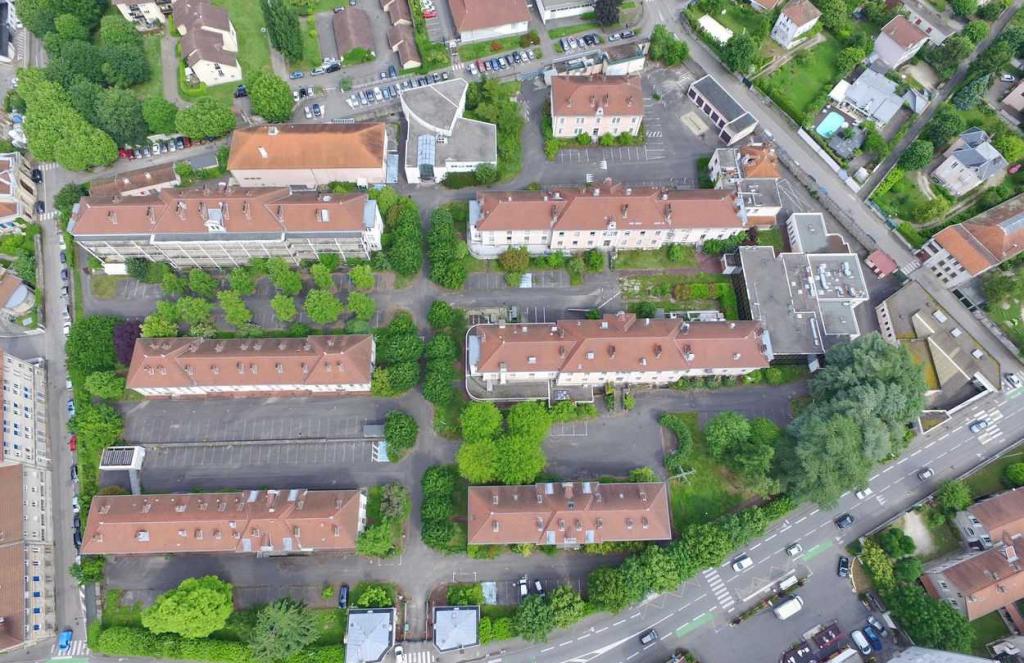Thessaloniki gets ready for its metro launch in November
The underground rapid transit lines have been under construction for almost two decades due to various project delays
 TheMayor.EU logo
TheMayor.EU logo 
The site of the former military hospital in Grenoble before demolition, Source: Grenoble Alpes Metropole
Urban renovation never seemed too concerned with the question of material waste – but this is changing
Urban construction and renovation have always existed in the sphere of ‘what comes next’ - the optimism of development that has no time to spare a thought on environmental impact. A larger consciousness has emerged in recent years, however. That’s because raw material extraction, manufacturing and construction account for up to 12% of national greenhouse gas emissions in Europe and over 35% of the EU’s total waste generation.
What’s more, France has now legally mandated that 70% of construction waste has to be recovered. The problem is that there is a mindset among the general society and the industry that the reusing of construction materials is costly and time-consuming. This is how the Cadran Solaire project in Grenoble (France) came about as a way to show that it doesn’t have to be that way.
The redevelopment of a former military hospital complex in the district of La Tronche into a mixed-use residential and public facilities site was signposted as the testbed for a green demolition process. In essence, its aim was to put the materials used for the building of the 1911 hospital back on the contemporary market. The results were astonishing.
The key to success in rethinking the construction-demolition-renovation loop was to involve the local residents and their market demand for building materials. The project planners bet on the maxim that in nature nothing goes to waste, it only changes its purpose.
On the one hand, they aimed to re-utilize whatever materials they could for the building of the new site, including the creation of street furniture, from gabions to garden structures.
Creativity extended to the remains of buildings too, with fragmented spaces turned into outdoor gardens and old basements into rain basins. Where recovered materials were in such bad condition they couldn’t be reused, workshops were set up to demonstrate their upcycling potential.
The project organizers, however, also decided to try out another avenue that if successful would really create a temporary circular economy in the wake of the renovation. All the material that couldn’t be reutilized was put up for sale at the Batitec store.
The store was one of the many examples of how the city found creative ways to involve its people in an operation that is too technical to be directly carried out by citizens. Open to the general public and professionals, it allowed the direct resale of materials collected on-site, without transporting the materials from one place to another. It also functioned as an information point for interested residents.
A series of additional activities with a circular economy aspect ran during the demolition: donations of plants on-site in partnership with classes from the local horticultural high school; and a grant of urban equipment for the development of parks.
The project exceeded its initial objective of recovering 85% of the materials, with 98% of the waste from the site being recovered. The project has also created new jobs: ten jobs for the project’s duration, of which turned into six permanent jobs.
The Cadran Solaire was also successful in another way. It helped Grenoble win one of the Eurocities 2022 Awards in the category ‘Lead together – scalable solutions for positive climate impact’.

The underground rapid transit lines have been under construction for almost two decades due to various project delays

Now you can get your wine in Talence by paying directly in Bitcoin

That’s because the state has to spend money on updating the railway infrastructure rather than subsidizing the cost of the popular pass

Rethinking renewable energy sources for the urban landscape

The examples, compiled by Beyond Fossil Fuels, can inform and inspire communities and entrepreneurs that still feel trepidation at the prospect of energy transition

Now you can get your wine in Talence by paying directly in Bitcoin

The 10th European Conference on Sustainable Cities and Towns (ESCT) sets the stage for stronger cooperation between the EU, national and local level to fast track Europe's transition to climate neutrality.

At least, that’s the promise made by the mayor of Paris, Anne Hidalgo

The underground rapid transit lines have been under construction for almost two decades due to various project delays

At least, that’s the promise made by the mayor of Paris, Anne Hidalgo

Hostal de Pinós is located in the geographical centre of the autonomous region

Despite its church-y name, the district has long been known as the hangout spot for the artsy crowds

Urban dwellers across the EU are having a say in making their surroundings friendlier to people and the environment.

Forests in the EU can help green the European construction industry and bolster a continent-wide push for architectural improvements.

Apply by 10 November and do your part for the transformation of European public spaces

An interview with the Mayor of a Polish city that seeks to reinvent itself

An interview with the newly elected ICLEI President and Mayor of Malmö

A conversation with the Mayor of Lisbon about the spirit and dimensions of innovation present in the Portuguese capital














